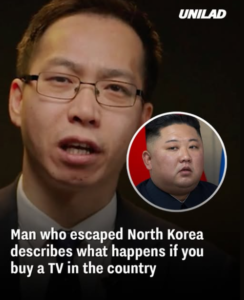A man who successfully escaped from North Korea has revealed the shocking reality of what happens when an ordinary citizen buys a television in the repressive country. His firsthand account sheds light on the extreme control the North Korean government exerts over its people, particularly in limiting their access to outside information.
According to the defector, purchasing a television in North Korea is not as simple as walking into a store and picking out a model. Every television sold in the country is pre-programmed to only receive government-approved channels, which exclusively broadcast propaganda and state-controlled news. This ensures that citizens have no access to foreign media, which the regime considers a direct threat to its authority.
The process of buying a TV itself is heavily monitored. Buyers must register their purchase with the government, and officials keep records of who owns each device. Once a TV is purchased, authorities regularly conduct random inspections to make sure it has not been tampered with. North Koreans caught modifying their TVs to receive foreign broadcasts—especially from South Korea—face severe punishments, ranging from imprisonment to execution.
The defector described how North Korean authorities use a technique called “signal jamming” to prevent outside broadcasts from reaching citizens. However, despite the strict measures, some people risk their lives to access forbidden content. Smuggled satellite dishes and USB drives loaded with South Korean dramas or foreign news reports have become a lifeline for those seeking the truth about the outside world.
One of the most dangerous aspects of owning a television in North Korea is the risk of being caught watching unauthorized content. The defector explained that the government operates a secret police force, known as the Group 109 Inspection Unit, which specializes in tracking down individuals who consume foreign media. These officers conduct surprise raids on households, checking televisions, computers, and even personal belongings for signs of illegal content.
Those caught watching foreign programming face brutal consequences. The punishment depends on the severity of the offense, but at minimum, individuals are sent to labor camps, where they endure forced labor, starvation, and inhumane treatment. In more extreme cases, public executions have been carried out to serve as a warning to others.
Despite these risks, many North Koreans continue to seek alternative sources of information, driven by curiosity and a desire for freedom. The defector recalled how seeing a single South Korean drama changed his perception of the outside world. He realized that the North Korean government had been lying about its depiction of life beyond its borders, ultimately fueling his decision to escape.
His story highlights the desperate lengths to which the regime goes to maintain its control over information. While North Korea tries to keep its citizens in the dark, technology and smuggled content continue to challenge its strict censorship. For many North Koreans, a simple television is not just a household appliance—it is a battleground between oppression and the pursuit of truth.


